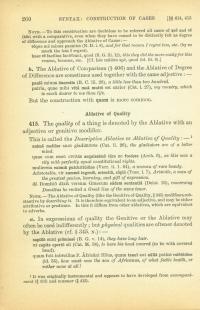415. The quality of a thing is denoted by the ablative with an adjective or genitive modifier. This is called the Descriptive Ablative or Ablative of Quality.1
Animō meliōre sunt gladiātōrēs. (Cat. 2.26)
The gladiators are of a better mind.
quae cum esset cīvitās aequissimō iūre ac foedere (Arch. 6)
as this was a city with perfectly equal constitutional rights
mulierem eximiā pulchritūdine (Verr. 2.1.64)
a woman of rare beauty
Aristotelēs, vir summō ingeniō, scientiā, cōpiā (Tusc. 1.7)
Aristotle, a man of the greatest genius, learning, and gift of expression
Dē Domitiō dīxit versum Graecum eādem sententiā.
(Deiot. 25)
Concerning Domitius he recited a Greek line of the same tenor.
Note— The Ablative of Quality (like the Genitive of Quality, § 345) modifies a substantive by describing it. It is therefore equivalent to an adjective, and may be either attributive or predicate. In this it differs from other ablatives, which are equivalent to adverbs.
a. In expressions of quality the genitive or the ablative may often be used indifferently; but physical qualities are oftener denoted by the ablative (cf. § 345, Note).
Capillō sunt prōmissō. (B. G. 5.14)
They have long hair.
ut capite opertō sit (Cat. M. 34)
to have his head covered
(to be with covered head)
Quam fuit inbēcillus P. Āfricānī fīlius, quam tenuī aut nūllā potius valētūdine! (id. 35)
How weak was the son of Africanus, of what feeble health, or rather none at all!

